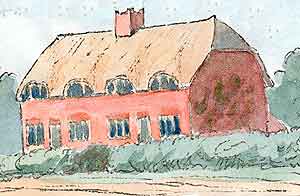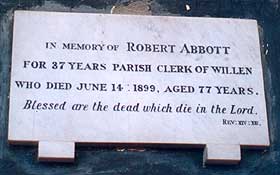 |
 |
 |
 |
 |
 |
 |
 |
 |
 |
 |
 |
 |
 |
 |
 |
 |
 |
 |
 |
 |
 |
 |
 |
Willen People
|
 |
 |
 |
 |
 |
 |
Robert Abbott, Parish Clerk & Sub-Postmaster
|
 |
 |
 |
 |
 |
 |
In 1881 Robert Abbott (59) lives with his widowed sister Eleanor Faulkner (72) in the village Sub-post Office (now known as Holly Tree Cottage). He is the grandson of Blind William Abbott. |
 |
 |
 |
 |
Robert's father, Thomas, moved into the cottage shortly after it was built in 1814. The cottage, on the left in the picture, was managed by the Overseers of the poor so Thomas was clearly a poor man. Thomas & his second wife, Elizabeth, had twelve children of whom Robert was one. Most married and moved on, but Robert stayed and never married.
|
 |
 |
 |
 |
 |
 |
 |
 |
 |
 |
 |
 |
 |
 |
 |
Though poor, both Thomas and Robert could write beautifully. The reason for this must be that Thomas, being the grandson of Jonathan Abbott, the most important farmer in Willen, had had a private education before his father William lost his sight and with it his inheritance. Thomas must have taught his son Robert. This education allowed Thomas to become Parish Clerk and to establish a Sub-post Office in their front room. Robert was a gardener by trade, (perhaps learnt from his grandfather who was clearly a keen gardener), but when his parents died he took over as Parish Clerk and Sub-Postmaster. |
 |
 |
 |
 |
 |
 |
 |
 |
 |
 |
 |
 |
 |
It is likely that Robert got Eleanor, his widowed sister, to mind the shop most of the time. 1884 was a bad year, Eleanor died in early June and within 10 days two more of Robert's siblings, Martha and Alfred, had followed her. They came from Sherington and Birmingham respectively and died in Willen. |
 |
 |
 |
Presumably, they came for Eleanor's funeral and must have caught a nasty disease while staying with Robert. He wouldn't have been an experienced cook, so perhaps he gave them food poisoning. As to the Post Office, maybe Robert felt he could not devote the time to running it, felt too upset to carry on, or was under pressure to close, because he was unwilling to take on parcels, telegraph and some other more demanding duties that the PO was keen to introduce at this time. Whatever the reason, six months later the post office was shut and replaced by a post box in the wall by the churchyard gates. Robert died in 1899 and is commemorated by a plaque in the church and a stone in the graveyard. |
 |







